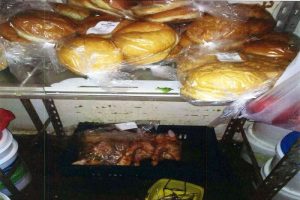A pest-infested and filthy chicken shop is just one of several Canberra eateries found to pose a serious public health risk that have not been inspected in more than a year.
 Meanwhile, stretched resources are causing inspectors to audit Canberra restaurants an average of every three years — sometimes as rarely as every five.
Meanwhile, stretched resources are causing inspectors to audit Canberra restaurants an average of every three years — sometimes as rarely as every five.
Clare Sibthorpe of ABC reports that documents obtained under freedom of information laws outlined a June 2016 inspection report of a chicken takeaway store, revealing pests inside raw ingredients, chicken festering in unsafe temperatures in the heated display, and the storeroom floor covered in exposed food and rubbish.
A build-up of dried meat, juice and scraps were found throughout the store, including on the preparation equipment.
The venue, which was previously investigated for a public food safety complaint, was forced to close while it fixed the critical food-handling and hygiene breaches.
It has not been inspected since re-opening in November 2016 and it is not an isolated case.
Seven of the 19 businesses handed prohibition orders for serious food safety breaches in the past three years have not been reinspected — four of these have closed since their orders were revoked and the remaining three are scheduled for their first check-up in 2018, two years after committing the breaches.
The ACT Government Health Protection Service’s (HPS) executive director, Conrad Barr, said the need to follow up on businesses with poor records depended on individual circumstances.
He said the chicken store was not followed up because it underwent a major refit and no customers had since complained.
As for random inspections, Mr Barr said the HPS aimed to “about every three years, get around to inspect a food business in the territory”.
 The HPS’s compliance strategy, dated 2012, said high-risk businesses, including those with poor records, should be inspected annually, which is the same policy in several other parts of Australia.
The HPS’s compliance strategy, dated 2012, said high-risk businesses, including those with poor records, should be inspected annually, which is the same policy in several other parts of Australia.
But Mr Barr said even Canberra’s three-yearly inspection target was “not always achieved”.
“I’m certainly aware of it can be up to five years for [us to inspect] a business … if it is new,” he said.
“We have a small, dedicated pool and if people are unwell or on leave then that decreases the number of people we have to undertake inspections.
“Sometimes we have a lot of complaints that take us away from our programming.”
But he said he was confident the team could effectively respond to any critical issues.
Last year ACT Health received 377 complaints relating to the territory’s 3,126 registered food businesses — down 20 per cent on 2016, but up 45 per cent from 2015.
Lauren Kish will never fully recover from the salmonella poisoning she and her husband caught from a cronut at a Canberra cafe last year.
The infection, which landed Ms Kish in hospital for 10 days, reversed the effect of a critical stem-cell transplant that had halted the progress of her multiple sclerosis, bringing back symptoms such as severe fatigue and disability.
“To know it could have a detrimental effect on my long-term health was really scary,” she said.
“I don’t feel safe going out and venturing out and having a social life like we used to because I’m scared I’m going to get sick again … which my body just can’t afford.”
Public Health Association Australia chief executive Michael Moore called for more resources for the HPS to prevent food illness.
“People would like to know food businesses are inspected much more regularly, particularly if there is a cloud hanging over them,” Mr Moore said.
“Of course we would like to see more staff dedicated specifically to this area.
“While majority of restaurants do the right thing, we can’t be complacent because what will happen is there will be an outbreak.”
Mr Moore, a former ACT health minister and Canberra cafe owner, called for the reintroduction of a “scores on doors” program, where businesses publicly display hygiene ratings based on inspection results.
 The owner of Ricardo’s, Rick DeMarco, 32, was cleared of the most serious charges spanning from an investigation in February 2017, which began after customers complained of food poisoning on social media.
The owner of Ricardo’s, Rick DeMarco, 32, was cleared of the most serious charges spanning from an investigation in February 2017, which began after customers complained of food poisoning on social media.










